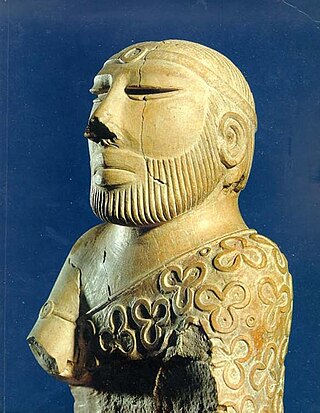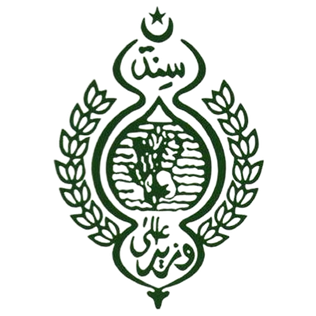Related Research Articles

Sindh is a province of Pakistan. Located in the southeastern region of the country, Sindh is the third-largest province of Pakistan by land area and the second-largest province by population after Punjab. It is bordered by the Pakistani provinces of Balochistan to the west and north-west and Punjab to the north. It shares an International border with the Indian states of Gujarat and Rajasthan to the east; it is also bounded by the Arabian Sea to the south. Sindh's landscape consists mostly of alluvial plains flanking the Indus River, the Thar Desert of Sindh in the eastern portion of the province along the international border with India, and the Kirthar Mountains in the western portion of the province.

Sind was a province of British India from 1 April 1936 to 1947 and Dominion of Pakistan from 14 August 1947 to 14 October 1955. Under the British, it encompassed the current territorial limits excluding the princely state of Khairpur. Its capital was Karachi. After Pakistan's creation, the province lost the city of Karachi, as it became the capital of the newly created country. It became part of West Pakistan upon the creation of the One Unit Scheme.
Sindhis are an Indo-Aryan ethnolinguistic group, originating from and native to Sindh, who share a common Sindhi culture, history and language. The historical homeland of Sindhis is bordered by the southeastern part of Balochistan, the Bahawalpur region of Punjab and the Kutch region of Gujarat.
Shah Nawaz Bhutto, 8 March 1888 – 19 November 1957, was a politician and a member of Bhutto family hailing from Larkana in the Sind region of the Bombay Presidency of British India, which is now Sindh, Pakistan.

Sindh cricket team was a domestic cricket team in Pakistan representing Sindh province. It competed in domestic first-class, List A and T20 cricket competitions, namely the Quaid-e-Azam Trophy, Pakistan Cup and National T20 Cup. The team was operated by the Sindh Cricket Association.

The Sindh Regiment is an infantry regiment of the Pakistan Army established on 1 July 1980. The regiment takes its name from Sindh province in southern Pakistan. Prior to its formation, there was no regiment in the Pakistan Army specifically intended to recruit primarily from the Sindhi population. The regimental centre is located in Hyderabad, Sindh, Pakistan.

The four provinces, capital territory, and two autonomous territories of Pakistan are subdivided into 38 administrative "divisions", which are further subdivided into districts, tehsils, and finally union councils. These divisions were abolished in 2000, but restored in 2008.

The history of Sindh refers to the history of the modern-day Pakistani province of Sindh, as well as neighboring regions that periodically came under its sway.
Mumtaz Ali Khan Bhutto, was a Pakistani politician who served as 8th Governor of Sindh and later the 13th Chief Minister of Sindh. He was also the first cousin of late Zulfiqar Ali Bhutto, who was the Prime Minister of Pakistan from 1973 to 1977.

Hyderabad Division is an administrative division of the Sindh Province of Pakistan. It was abolished in 2000 but restored again on 11 July 2011. CNIC code of Hyderabad Division is 41. Hyderabad is the divisional headquarters of Hyderabad Division.
The Sindhudesh Movement is a separatist movement, based in Sindh, Pakistan, seeking to create a homeland for Sindhis by establishing an ethnic state called Sindhudesh, which would be either autonomous within Pakistan or independent from it.
The governor of Sindh is the appointed head of the province of Sindh, Pakistan. The office of the governor as the head of the province is largely a ceremonial position; the executive powers lie with the chief minister and the chief secretary of Sindh.
The Sind United Party or Sind Ittehad Party was a political party in Sind, British India. The party was founded in June 1936, the same year that the Sind province had been created. The party was modelled on the Punjab Unionist Party. In the 1937 election to the Sind Legislative Assembly, the party emerged as the largest party with 21 seats in the Assembly and formed a provincial government.
Mukhi Gobindram Pritamdas was an Indian merchant and politician from Hyderabad, Sindh. He won a seat from Upper Sindh, Frontier District in the Sind legislative assembly in the 1937 election. Before being elected to the legislative assembly, he had been a member of the Hyderabad Municipal Council for fifteen years. He had also presided over various social welfare organisations.

The Sindh Hari Committee was a leftist and Sindhi nationalist political organization in Sindh, Pakistan that sought to promote the interests of the Haris of Sindh. It was founded in 1930 by G. M. Syed. In 1947, Hyder Bux Jatoi took over as president of the committee until his death in 1970. In 1957, it became a constituent party of the National Awami Party.

Provincial elections were held in British India in the winter of 1936–37 as mandated by the Government of India Act 1935. Elections were held in eleven provinces - Madras, Central Provinces, Bihar, Orissa, the United Provinces, the Bombay Presidency, Assam, the North-West Frontier Province, Bengal, Punjab and Sind.
Sayyid Shah Mardan Shah-II widely known as Pir of Pagaro VII was the spiritual leader of Hurs and president of political party Pakistan Muslim League (F). He was commonly known in Pakistan as Pir Sahib Pagara and Pir Shaab. He was an influential figure in Pakistani politics and the leader of Hur Force in Pakistan who participated in the Indo-Pakistani War of 1965. He was also a first-class cricketer. He died on 10 January 2012 in London, due to liver infection.

Sir Abdullah Haroon was a British Indian politician and businessman who made major contributions towards developing and defining the role of Muslims in economic, educational, social and political fields in the Indian subcontinent.

The chief minister of Sindh, is the elected head of government of Sindh and serves alongside the Chief Secretary. Syed Murad Ali Shah is the current Chief Minister of Sindh, serving as a Government of Sindh since 26 February 2024.
The Larkana–Jacobabad Light Railway was one of several branch lines in Pakistan, operated and maintained by Pakistan Railways. The line began at Larkana Junction and ended at Jacobabad Junction. The total length of this railway line is 136 kilometers (85 mi) with 14 railway stations.
References
- ↑ Soomro, Mohammad Qasim. Muslim Politics in Sindh, 1938-1947 . Jamshoro, Sindh, Pakistan: Pakistan Study Centre, University of Sindh, 1989. p. 29
- ↑ "Archived copy" (PDF). Archived from the original (PDF) on 4 March 2012. Retrieved 19 June 2010.
{{cite web}}: CS1 maint: archived copy as title (link)